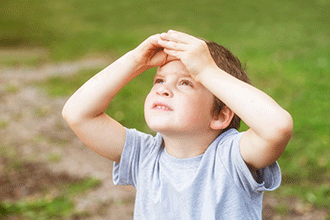
PARTIALLY TRUE.
Carrots contain vitamin A, which is good for eye health. So, there is some truth behind the saying that carrots help you see better. However, there is not enough proof to say for certain that eating carrots actually improves your eyesight.
The saying that carrots help you see better is thought to have originated during World War II. British intelligence told everyone that their pilots had the best vision because they ate a lot of carrots.
In truth, British pilots were using radar to find their targets. They made up the rumor because they didn’t want German troops to learn about their tactics.
Contact lenses can get “lost” in your eyesFALSE.
It is physically impossible for a contact lens to get trapped behind the eyeball. The inside of our eyelids, called the conjunctiva, folds in a way that makes it one continuous layer. The conjunctiva lines the inside of the eyelids, folds over and covers the white part of the eye — the sclera.
This covering creates a barrier, making it impossible for something to go behind the eye.
Even if a contact lens accidentally folds while it’s in your eye and is hidden under the upper eyelid, it can easily and painlessly be retrieved.
Tip: Close your eyes and gently massage the eyelid, and the contact lens should move to a place on the eye where you can retrieve it.
SEE RELATED: 10 myths about contact lenses
Reading in the dark is bad for your eyes
FALSE.
While reading in the dark may cause temporary eye strain, it does not cause lasting damage to the eyes. Eye strain occurs when the muscles in the eyes are being forced to focus in poor conditions, like not having enough light.
The eyes may feel sore or tired, and headaches may occur as a result of eye strain. However, once the eyes are able to relax, symptoms usually resolve on their own.
Corneal transplants will make you see what the donor sawFALSE.
This myth makes for a great scary movie storyline, but just like believing there are monsters under the bed, there is no truth behind it.
Corneal transplants replace scarred or diseased corneal tissue, and restore clear vision. The old tissue is replaced with healthy tissue gifted by a donor.
Some people feel uneasy about receiving corneal tissue from another person, because they think it will affect what and how they see. Rest assured, corneal tissue helps focus light in the eyes; there are no memories attached to it.
This myth can be harmful, because it may scare viable candidates from getting a sight-saving transplant. If a corneal transplant could help restore your vision, please consider it. The procedure is considered the most successful of any tissue transplant.
Doing eye exercises will make you no longer need glassesFALSE.
The idea that eye exercises can improve your vision started back in the 1920s. However, eye exercises work the muscles around the eyes, and vision problems don’t usually stem from weakened eye muscles.
Refractive errors, which are the common cause of blurry vision, deal with how the eyes focus light. The parts of the eye responsible for this are the length and shape of the eyeball itself, or the shape of the cornea.
Eye exercises don’t change or improve the eye’s length or the cornea’s shape. So, it’s safe to conclude that they won’t improve your vision; nor will they eliminate your need for glasses.
Note: Certain eye exercises, called vision therapy, can help with alignment issues but still do not change refractive error.
If you cross your eyes too much, they’ll stay like that forever
FALSE.
Family members love to tell kids that crossing their eyes will get them stuck that way — especially if someone hits you on the back while they’re crossed. Well, rest assured, kids; crossing your eyes may strain them, but it won’t get them stuck.
People whose eyes are crossed naturally have a condition called strabismus. It’s caused by a problem with the eye muscles, or in the vision centers of the brain. A recent study found that a little over 3% of children between 6 and 8 years old have strabismus.
Strabismus can be treated with corrective lenses, vision therapy or surgery. It’s important to correct strabismus early, or it can develop into amblyopia, which affects vision in the weak eye.
Children will “grow out of” eye problemsMOSTLY FALSE.
Let’s preface this answer by saying it is almost always false. In most circumstances, children do not grow out of vision problems. More often, uncorrected vision issues can worsen over time. So, if you suspect a vision problem in your child, get them in for a comprehensive eye exam.
One exception in which children can grow out of a vision problem is with hyperopia. Hyperopia (farsightedness) is a refractive error that makes distant objects look clear while close up objects are blurry.
This is common in children because their eyeballs are shorter than normal, which causes light to fall behind the retina. Kids usually grow out of hyperopia because their eyeballs grow with the rest of their bodies as they get older. The condition usually stabilizes around age 7 and may decrease slightly between ages 7 and 12.
Sitting too close to the TV or playing video games frequently is bad for your eyesFALSE.
Sitting too close to the TV will not damage your eyes. However, it may cause digital eye strain and the symptoms that go with it.
If your child sits too close to the TV, it may be because the TV looks blurry from farther away. Sitting close to the TV is a sign of myopia (nearsightedness) in children. If your child makes a habit of sitting closely when watching TV, it may be time for an eye exam.
Like watching TV, playing video games will not hurt your or your child’s eyes, though it can also cause digital eye strain. But there are lens filters that can help prevent digital eye strain both while watching TV and playing video games.
Studies have even found that certain video games can actually improve vision and treat certain eye conditions.
According to research, “action” video games enhance the visual skills used to read and drive at night. Another study tested whether playing video games helped people with amblyopia. Results showed that playing certain video games were more effective in improving amblyopia, and showed results faster than other treatment methods.
Note: This does not change the importance of children being physically active. It is always a good idea to limit screen time and encourage outdoor activity.
SEE RELATED: Gaming glasses
It’s safe to look at the sun as long as…
FALSE.
It is never safe to look at the sun, even if you’re wearing sunglasses. The sun emits powerful ultraviolet rays that can damage different parts of the eye, including the cornea, the retina and the lens. Even the best sunglasses don’t filter 100% of UV rays.
Sun damage to the retina is known as solar retinopathy. It is usually painless, so people don’t realize the damage is being done. Many times this can result in permanent partial vision loss.
During a solar eclipse, when the sun is partially covered, it’s still unsafe to look at the sun unless you’re wearing a pair of certified eclipse glasses. Proper eclipse glasses meet the ISO 12312-2 international standard for safe viewing of the sun.
Sun exposure is good for your eyesMOSTLY FALSE.
It was just explained that looking at the sun is a bad idea — that ruling still stands. But, sun exposure does offer a few benefits.
Sunlight helps regulate wake and sleep cycles, as well as mental health. Spending at least two hours outdoors during daylight is also linked to preventing myopia development in children.
While sunlight isn’t totally bad for your eyes, it’s still important to practice safety when out in the sun. Be sure to wear quality sunglasses that protect your eyes from problems linked to sun exposure. You should also wear sunscreen to protect your skin from sun damage that can lead to skin cancer.
SEE RELATED: Is sun gazing safe for the eyes?
Having a child hold books close to the face will damage their eyesPARTIALLY TRUE.
Holding books close to the face will not necessarily damage a child’s eyes. However, children who frequently perform near work, like reading or using digital screens, are at a higher risk of myopia development.
When holding reading or viewing material, have your child practice the elbow rule. If they extend their arm directly out in front of them, the page or screen should be no closer to their face than their elbow.
It’s also good for kids to spend some time outdoors to balance out the nearwork. They get the most benefit from it when the outdoor time immediately follows the nearwork.
Wearing glasses can make your eyesight worseFALSE.
Wearing glasses or contact lenses will not make your eyesight worse.
People may think glasses make their vision worse because when they take their glasses off, things appear “blurrier” than before they wore glasses. The truth is that once your vision is corrected, it becomes more obvious how bad it was before it was corrected.
It’s common for vision to change as we age. But it doesn’t worsen due to the correction of glasses or contacts.
20/20 vision means your eyes are perfectFALSE.
Someone who has 20/20 vision basically has “normal” or “average” vision. 20/20 is a measurement of how sharp a person’s vision is, known as visual acuity. Visual acuity is important for vision, but is not the only factor to consider.
For example, a person can have 20/20 vision and also be color blind. It’s also possible for someone to have 20/20 vision and have glaucoma. It’s even possible to have better than 20/20 vision.
20/20 vision simply means average eyesight.
You only need to have eye exams if you have bad eyesightFALSE.
Eye exams are important at all ages, whether you have poor or “perfect” eyesight. As mentioned above, you can have good eyesight and still have a problem with your eyes or vision.
During a comprehensive eye exam, an eye doctor checks your vision and the inside of your eyes to make sure everything is working as it should. Based on what they find, they will be able to tell you how often you need to go back for future exams. Plus, there are many systemic illnesses that can be detected during an eye exam.
There’s no way to know if a problem is present unless you see an eye doctor. Schedule an eye exam to make sure your eyes and vision are at their best.
And one more thing…
Too much masturbation causes blindnessFALSE.
A well-established myth often used by morally conscious parents is that too much (or any, depending on the parents) masturbation will lead to blindness.
This myth dates back to the 1700s with the introduction of two popular, at the time, publications: a pamphlet titled Onania: or, the heinous sin of self-pollution and the subsequent L'Onanisme. L'Onanisme was published by “well-reputed Calvinist Protestant neurologist, physician, professor and Vatican adviser” Samuel-Auguste Tissot. And it is said to have been heavily influenced by the Onania pamphlet.
As is now clear, both publications (and the myth which grew from them) were merely attempts at demoralizing the act of “self-pleasure.” In fact, masturbation is considered by most of the medical community to actually have a number of health benefits.
When in doubt, talk to an eye doctorIn conclusion, if you stumble upon or even grew up believing anything regarding your vision or eye health that you’re now unsure about, talk to your eye doctor. They can set the record straight and dispel any troublesome myths.
And while they’re at it, they can make sure your eyes and vision are healthy and clear.